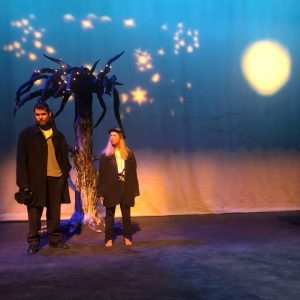By Ryan Di Corpo

The Lord Chamberlain condemned its language. Sir John Gielgud labeled it “a load of old rubbish.” Norman Mailer referred to its disciples as “intellectual snobs of undue ambition.” Kenneth Tynan declared that it “jettisons everything by which we recognize theatre.” It is a behemoth, a benchmark, a perversity, a sacrality.
“Waiting for Godot” was set loose Wednesday night at Collins Auditorium by The Mimes and Mummers.
“Godot,” subtitled “a tragicomedy in two acts,” was originally written by Samuel Beckett between 1948 and 1949 and published under its French title, “En attendant Godot.” This year marks the 65th anniversary of its theatrical premiere in Paris.
Despite a maddening lack of a clear sense of time in the play, time has been good to “Godot.” The play was voted in a British National Theatre poll in 1990 as “the most significant English language play of the 20th century.”
To put it mildly: staging a production of “Godot” is no small feat, for the play now marries its august reputation with its nearly impenetrable storyline and seemingly directionless prose.
The basic story of the play involves the vagrants Vladimir and Estragon, considered by Mailer to be “a male and female homosexual,” waiting under a singular tree for the arrival of someone, or perhaps something, named Godot. During their wait, Vladimir and Estragon engage in a series of rather trivial conversations, many of which make direct and indirect references to God, Scriptural passages, the afterlife and other Christian motifs.
Vladimir and Estragon also twice meet the imperious, domineering Pozzo and his (mostly) mute, enslaved drudge Lucky.
It is not useful here to try to ascertain the capital-m Meaning of the play, as “Godot” has inspired a large variety of interpretations and explanations since its publication. The play does not seek to be fully understood; it derives power from its ambiguity and self-referential emptiness.
The Mimes and Mummers production, directed by Conrad Kluck, does an impressive job of bringing to life the show’s comedy, absurdity and pervasive sense of nihilism.
The production design is sparse, consisting of a large rock and a single tree with tentacle-like, contorted branches. The staging throughout the show is excellent, which helps the stage feel full despite its lack of grandiose sets and a large cast.
Furthermore, the show’s lighting and nighttime backdrop clearly aim to evoke the image of the play’s inspiration: the early 19th century painting Two Men Contemplating the Moon by Caspar David Friedrich.
Essential to this production’s success is the strong work of its cast members. There is a quiet storm —something in the eyes — at all times within Tom Cobb’s Vladimir. Cobb convincingly conveys Vladimir’s increasing sense of uncertainty and frustration, sometimes through only a long-distance stare aimed towards the back of the theatre. He continually seems as though he is not simply waiting, but searching, for Godot.
Lily Ochs is similarly compelling through her use of facial expressions: a grimace of pain as she tends to her injured foot, a wide-eyed look of terror as an unknown visitor approaches. The success of the play is dependent not only upon the lead characters’ ability to master complicated dialogue, but to foster a believable sense of chemistry between themselves.
Both Cobb and Ochs deliver in this regard. You believe that they are longtime acquaintances (Mailer would use a stronger word) and not strangers in the night.
Ochs’ command of the art of acting through facial expressions mirrors Jillian Rivera’s performance as “a boy.” Rivera captures the trepidation and anxious honesty of the youth tasked with informing Vladimir and Estragon of Godot’s whereabouts.
The boy is the only character in the play who has direct contact with Godot; he is the prophet of a far-off God who, according to Vladimir, will “punish” him and Estragon if they were to leave their assigned waiting place.
Michael Bottei, as Pozzo, demonstrates a great ability to explode at any moment. He is at once playful, then writhing in anguish, then bellowing at whoever will listen.
Yet, in the hands of Bottei, none of this seems uncontrolled or unhinged. Bottei makes deliberate choices and then executes them to present a Pozzo both complex and captivating.
However, the award for most physically demanding performance goes to Austin Yang as Lucky. With the exception of his rambling, feverish central speech on everything from sports to “divine athambia,” Lucky does not speak during the show. His back is bent towards the ground; his face is hidden from view of both of the audience and the characters on-stage.
Yang makes the most of the few times his face is revealed: accusing with his glare all who look upon him. He is a man dehumanized; a man animalized. It is a performance which brings to mind the words of Levinas: “The face, in its nudity and defenselessness, signifies: ‘Do not kill me.’”
The play is not easy on any of its performers, who are well-costumed in filthy clothes that contribute personality to the characters. Further, the performers roll around in cork dirt and consume pre-chewed chicken meat off the stage floor. All of this is done in a startling commitment to the demands of the play and, if you like, in a direct affront to Fordham’s Health Center.
“Godot” must be seen — and it need not be a chore. It is an enigma, but it is an entertaining, engrossing enigma.
And if you are a theatrical savant and are not somewhat flummoxed at the end of the show, see it again. Perhaps you didn’t get it.






































































































































































































